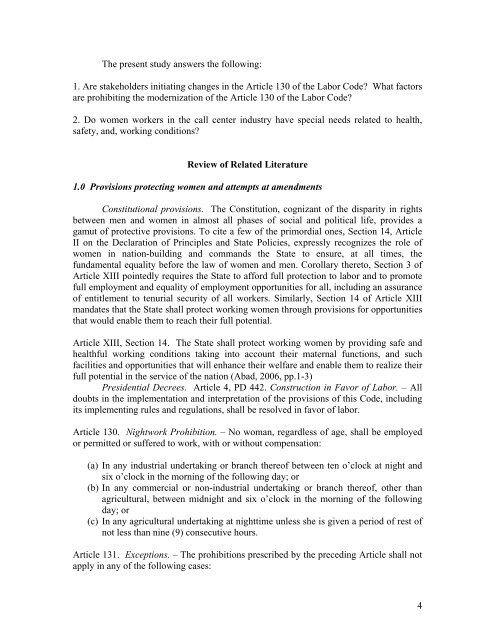Night Work Prohibition of Women Workers in the - International ...
Night Work Prohibition of Women Workers in the - International ...
Night Work Prohibition of Women Workers in the - International ...
Create successful ePaper yourself
Turn your PDF publications into a flip-book with our unique Google optimized e-Paper software.
The present study answers <strong>the</strong> follow<strong>in</strong>g:<br />
1. Are stakeholders <strong>in</strong>itiat<strong>in</strong>g changes <strong>in</strong> <strong>the</strong> Article 130 <strong>of</strong> <strong>the</strong> Labor Code? What factors<br />
are prohibit<strong>in</strong>g <strong>the</strong> modernization <strong>of</strong> <strong>the</strong> Article 130 <strong>of</strong> <strong>the</strong> Labor Code?<br />
2. Do women workers <strong>in</strong> <strong>the</strong> call center <strong>in</strong>dustry have special needs related to health,<br />
safety, and, work<strong>in</strong>g conditions?<br />
Review <strong>of</strong> Related Literature<br />
1.0 Provisions protect<strong>in</strong>g women and attempts at amendments<br />
Constitutional provisions. The Constitution, cognizant <strong>of</strong> <strong>the</strong> disparity <strong>in</strong> rights<br />
between men and women <strong>in</strong> almost all phases <strong>of</strong> social and political life, provides a<br />
gamut <strong>of</strong> protective provisions. To cite a few <strong>of</strong> <strong>the</strong> primordial ones, Section 14, Article<br />
II on <strong>the</strong> Declaration <strong>of</strong> Pr<strong>in</strong>ciples and State Policies, expressly recognizes <strong>the</strong> role <strong>of</strong><br />
women <strong>in</strong> nation-build<strong>in</strong>g and commands <strong>the</strong> State to ensure, at all times, <strong>the</strong><br />
fundamental equality before <strong>the</strong> law <strong>of</strong> women and men. Corollary <strong>the</strong>reto, Section 3 <strong>of</strong><br />
Article XIII po<strong>in</strong>tedly requires <strong>the</strong> State to afford full protection to labor and to promote<br />
full employment and equality <strong>of</strong> employment opportunities for all, <strong>in</strong>clud<strong>in</strong>g an assurance<br />
<strong>of</strong> entitlement to tenurial security <strong>of</strong> all workers. Similarly, Section 14 <strong>of</strong> Article XIII<br />
mandates that <strong>the</strong> State shall protect work<strong>in</strong>g women through provisions for opportunities<br />
that would enable <strong>the</strong>m to reach <strong>the</strong>ir full potential.<br />
Article XIII, Section 14. The State shall protect work<strong>in</strong>g women by provid<strong>in</strong>g safe and<br />
healthful work<strong>in</strong>g conditions tak<strong>in</strong>g <strong>in</strong>to account <strong>the</strong>ir maternal functions, and such<br />
facilities and opportunities that will enhance <strong>the</strong>ir welfare and enable <strong>the</strong>m to realize <strong>the</strong>ir<br />
full potential <strong>in</strong> <strong>the</strong> service <strong>of</strong> <strong>the</strong> nation (Abad, 2006, pp.1-3)<br />
Presidential Decrees. Article 4, PD 442. Construction <strong>in</strong> Favor <strong>of</strong> Labor. – All<br />
doubts <strong>in</strong> <strong>the</strong> implementation and <strong>in</strong>terpretation <strong>of</strong> <strong>the</strong> provisions <strong>of</strong> this Code, <strong>in</strong>clud<strong>in</strong>g<br />
its implement<strong>in</strong>g rules and regulations, shall be resolved <strong>in</strong> favor <strong>of</strong> labor.<br />
Article 130. <strong>Night</strong>work <strong>Prohibition</strong>. – No woman, regardless <strong>of</strong> age, shall be employed<br />
or permitted or suffered to work, with or without compensation:<br />
(a) In any <strong>in</strong>dustrial undertak<strong>in</strong>g or branch <strong>the</strong>re<strong>of</strong> between ten o’clock at night and<br />
six o’clock <strong>in</strong> <strong>the</strong> morn<strong>in</strong>g <strong>of</strong> <strong>the</strong> follow<strong>in</strong>g day; or<br />
(b) In any commercial or non-<strong>in</strong>dustrial undertak<strong>in</strong>g or branch <strong>the</strong>re<strong>of</strong>, o<strong>the</strong>r than<br />
agricultural, between midnight and six o’clock <strong>in</strong> <strong>the</strong> morn<strong>in</strong>g <strong>of</strong> <strong>the</strong> follow<strong>in</strong>g<br />
day; or<br />
(c) In any agricultural undertak<strong>in</strong>g at nighttime unless she is given a period <strong>of</strong> rest <strong>of</strong><br />
not less than n<strong>in</strong>e (9) consecutive hours.<br />
Article 131. Exceptions. – The prohibitions prescribed by <strong>the</strong> preced<strong>in</strong>g Article shall not<br />
apply <strong>in</strong> any <strong>of</strong> <strong>the</strong> follow<strong>in</strong>g cases:<br />
4

















